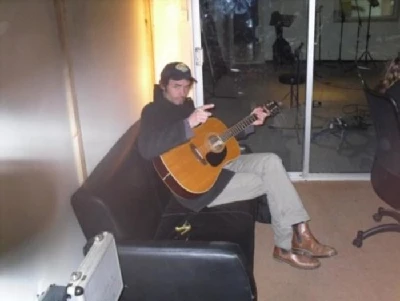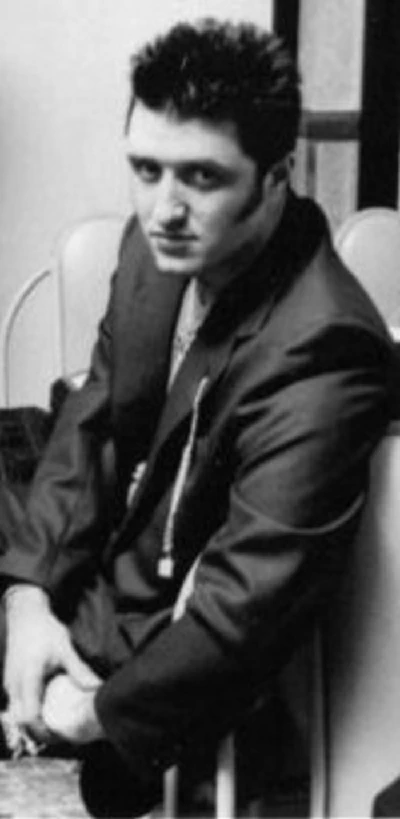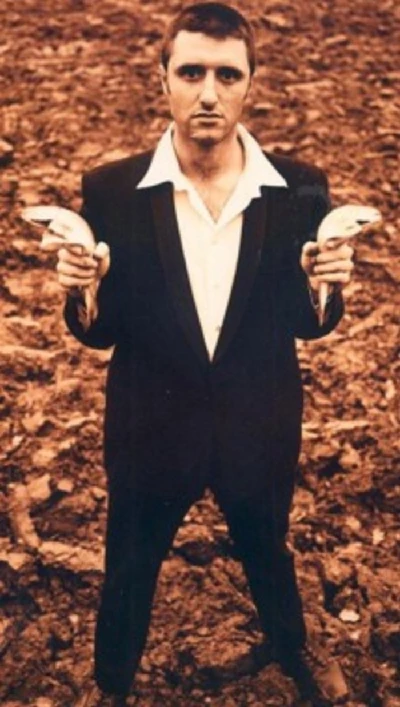published: 19 /
3 /
2009

British-based multi-instrumentalist, comedian, spoken-word punk poet and visual artist Ashley Reaks speaks to Lisa Torem about his often bittersweet, always jugularly honest latest album of music, 'Melancholia'
Article
British musician Ashley Reaks is a multi-instrumentalist, comedian, spoken-word punk poet and visual artist.
His newest release, 'Melancholia', reveals the most wild ravages of his fantastical imagination and fuses world music with a multiplicity of genres. His giftedness also extends to his detailed lyrics - sometimes ominous, often bittersweet - but always jugularly honest.
Themes touch on fairy tales, mythology and passion. Reak's range of influences reflect a recording artist with an unusually open, Michelangelo-type-mind.
It is rare for listeners to get the low-down on how such a curious, brilliant mind works.
Consider all of us lucky, then, to hear Ashley Reaks in his own words.
PB : First, of all, congratulations on the release of 'Melancholia'.I am definitely a 'Sucker for Your Punishment' because I have been hearing the riff of that first track over and over in my head since reviewing the album. I mean this in the most complimentary way. It is a very powerful album.
AR : Thank you. I've been pleasantly surprised at the positive response there has been to 'Melancholia'. It was a very liberating album for me to make and I'm happy with the way it turned out. 'Sucker for Punishment' has been around since 1997 so I'm glad it's got a good home to go to now.
PB : When you write and produce you invariably come to a fork in the road where you have to make artistic decisions. What have some of those decisions been ?
AR : It is important to me to produce the song, or piece of art as it wants to be made, not necessarily as I want to make it. I made a decision a few years back to do that and to not get in the way of the process. Part of the deal with that though is that I'm unlikely to have much commercial success!
I also try not to mess with art when it's finished – sometimes I don't like the finished product but I've learned when it's done and to leave it to breathe whilst I move onto the next thing.
PB : You have a vast list of influences, but in particular I noticed that you’ve been influenced by Steve Reich, the minimalist composer. What attracted you to this style of music ?
AR : I remember hearing Reich's 'Music for Mallet Instruments' and being transfixed. It reminded me of the hypnotic chimes of childhood. I find his music comforting and unsettling at the same time. Something about his inner world feels very familiar to me, which is true of all the artists and musicans I like.
PB : Are you familiar with a documentary called 'Satygraha' which has a score written by Philip Glass ? It shows impoverished people the world over and then there is this hypnotic Glass soundtrack behind it. If so, what did you think of this ?
AR : No...but maybe I'll take a look.
PB : And Bob Dylan ? He was an influence…
AR : I didn't connect with Dylan at all for a long time but fell under his spell a few years back. I particularly like 'Oh Mercy' and 'Time Out of Mind'. Lyrically Dylan and Joni Mitchell are in a different league in my book, though Nick Cave's hovering somewhere in the same space.
PB : Who is your favourite Beatle ?
AR : John Lennon had pain and beauty in equal amounts – The Plastic Ono Band album is a favourite of mine and 'Strawberry Fields Forever'. 'I am the Walrus' and 'Tomorrow Never Knows' never cease to amaze me. He was the Beatle who said "anyone can express themselves" with his wild experimentation and primtive howls of rage. And his voice !
PB : Yeah, I loved 'I am the Walrus' especially.
AR : But I never completely understood the "semolina pilcher climbing up the Eiffel tower" line.
PB : How did you pick-up the bass, keys and guitar?
AR : Bass was my first instrument. My Dad had one lying around when I was about 11 and discovering punk. We did a deal.I could have the bass if I had some music theory lessons from him. I spent the next two years playing along to 'It's Alive' by The Ramones and 'Metal Box' by PIL and when I got more accomplished 'Secondhand Daylight' by Magazine.
PB : If it was your last day on earth and you could only have one more meal and hear one more song what would they be ?
AR : A curry with an endless supply of sweet lassi – the song would be 'Bridge over Troubled Waters'
PB : That sounds fantastic! Do you practice transcendental meditation ?
AR : No. I've made a few aborted attempts at meditation but my mind is so crammed with white noise it's difficult. Listening to dub reggae and Steve Reich slows my brainwaves. Being in water has much the same effect and I love flotation tanks. Occasionally I go on retreat to a monastery for a week and bathe in the silence.
PB : Do you see yourself writing for film or television ?
AR : No, I am not disciplined enough to write to a set theme or plan. I am often told that some of my music sounds like film music though I don't set out to make it that way.
PB : What about classical music ? Any influences there ?
AR : Not really. I keep making attempts to listen to classical music, but after about 10 minutes I'm bored and give up. I do like Gorecki and some of the minimalist composers such as Reich, John Adams and Terry Riley which I was listening to around the time of 'Melancholia'
PB : Have you toured the U.S. or will you in the near future ?
AR : I toured the East Coast years ago with Francis Dunnery. I would love to tour there again.
PB : As far as your recording career, there is a marked difference between your last album 'Children Rule' and 'Melancholia'. How do you account for that ?
AR : Probably a few different reasons. I quite often swing from feeling very hopeful to abject hopelessness. My art and music is driven by my moods. I've learned to keep making stuff regardless of how I'm feeling.
Also I write a lot of songs so after a while there'll be 10 or so songs in roughly the same style and I'll make an album of them and enjoy exploring the genre. As a matter of fact I've just yesterday returned from recording a new album which is filled with banjos, pedal steel, ukeleles, saxaphones and trumpets. I am a marketing man's nightmare!
PB : Yes, but a dreamer's fantasy. What kind of upbringing did you have? Were there other artists and musicians in the family ? What I’m getting at is what motivated you to stretch yourself artistically to such an extent and in a variety of disciplines ?
AR : I do come from a musical family. My Mum and Dad still play in the same band they played in 50 years ago. My brother is a music teacher and the musical boffin in the family.
What motivates me most though is my relentless mind. I don't really get a say in it. I'm compulsively creative and if I don't create I'm miserable. I feel obliged to make sense and give birth to the barrage of images and music that are constantly in my mind. I'm always looking to create alternate worlds which I've done since I was young. In essence I tend to live in my imagination.
PB : And you don’t seem terribly concerned about creating a “hit record” that’s exactly three minutes long or exactly what a certain label is looking to market….
AR : I did try once. I set up a dark-electro pop band Younger Younger 28's and signed a major record deal. After a couple of years experiencing the horrors of the music industry I made a decision to make the music and art that came out of me, regardless of it's commercial limitations. It's the process of creativity I love and watching something appear that didn't exist previously. It is my version of giving birth.
PB What made you decide to add world music, like African drumming and Indian vocalizations to cuts in 'Melancholia' ?
AR : It went with whatever was inspiring me at the time. I've always liked the mixture of eastern influences in western music – The Doors' guitar playing, PIL and Jah Wobble, George Harrison's sitar, the Clash's reggae leanings, Killing Joke's tribal rhythms – and also I found the hugely talented Maria Jardardottir via MySpace and she sings and vocalises in an eastern way. Her voice fitted right in to the overall sound.
PB : How do you set about writing a piece like 'The Swamp People' ?
AR : 'Melancholia' was very spontaneous for the most part. I find that if I set out to write a song it usually doesn't get written so I work fast before I censor myself. 'The Swamp People' started out as a drum groove. The Aboriginal chants, guitars and lyrics I came up with as I recorded it. It was done in about an hour.
PB : : Shifting gears between performing comedy, music and creating art –how does that work?
AR : I go with wherever my energy is at any given time. It has its own rhythms. It'll be making collages for a few months and then suddenly I will have no interest in that but I want to make music. That'll last a while before it heads off somewhere else. I've learned to trust the cycles and let them lead me rather than trying to force a square peg into a round hole.
PB : As far as your comedy routines, what themes work the best with your audiences ?
AR My... er..comedy is very bleak at times and tends to disturb rather than amuse the majority of the audiences I've played to. It amuses me though - I use puppets and masks which always provoke a reaction! People always seem to like the sped up and pitched up voices for some reason,
PB : Is there a great work of art maybe from literature or music from which you can consistently draw passion or inspiration ?
AR : There are certain albums I go back to again and again. 'Hejira' by Joni Mitchell is probably my most played album. The sense of longing, melancholy and searching always resonates with me. The other would be 'Secondhand Daylight' by Magazine which sounds like my inner world. Also there are some artists I love. Whenever I look at Louis Soutter or Gaston Chaissac's work I want to make something.
PB : What are your favourite American and British bands?
AR : American – Elvis, the Ramones, Steely Dan, Joni Mitchell (does Canadian count?), Bob Dylan, Simon and Garfunkel, Johnny Cash,Nirvana, Captain Beefheart, Velvet Underground, the Doors.
British – Beatles, Magazine, the Cure, Prefab Sprout, the Ruts, Sex Pistols, Talk Talk, The Who, the Clash.
If I had to pick one of each it would the Beatles and Joni.
PB : There is something that I’ve noticed and I’m wondering if it is
just because I’m from the States. But through the years when I’ve heard pop music from England I hear a bittersweet quality in the ballads that I don’t recognize in a lot of American pop music. Is this my imagination or is this a particular phenomenon that happens in certain regions in England ?
AR : I don't know whether it's particular to England or certain areas but in the North where I'm from there's an air of melancholy beauty in the landscape and some of the music. Prefab Sprout have the bittersweet thing in large doses. There's an ache behind every song, even the hopeful ones. If you don't know them try 'Steve McQueen' or 'Jordan. The Comeback' or Paddy McAloon's solo masterpiece 'I Trawl the Megahertz'
PB : Okay, Ashley. I guess I've rattled off enough questions for now.I wish you continued success in all the wonderful things you do. Thank you.
AR : Thank you.
Band Links:-
http://www.ashleyreaks.com/
https://twitter.com/ashleyreaks
http://ashleyreaks.bandcamp.com/
https://www.facebook.com/ashleyreaksar
https://www.instagram.com/ashleyreaks/
https://www.youtube.com/user/ash231266
Have a Listen:-
Picture Gallery:-

